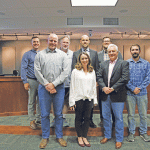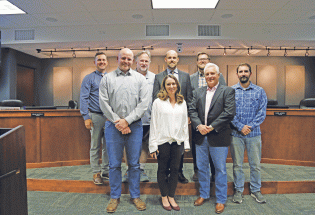Legality of trustee email in question
Discussion via email possibly violated state Sunshine Law
By John Gardner
The Surveyor
A recent email sent out by a Berthoud trustee apparently violated Colorado Open Meetings Law by discussing public business prior to a scheduled board meeting.
The email in question, obtained by the Surveyor through a Colorado Open Records Act request, was sent from Trustee Paul Alaback on Friday, Aug. 1, and was addressed to the other six trustees and Town Administrator Mike Hart, which under the state’s Sunshine Law technically constitutes a public meeting.
Colorado Sunshine Law stipulates that a “meeting” means “any kind of gathering convened to discuss public business, in person, by telephone, electronically, or by other means of communication. Any meetings” … “at which a majority or quorum of the body is in attendance, or is expected to be in attendance, shall be held only after full and timely notice to the public.If elected officials use electronic mail to discuss pending legislation or other public business among themselves, the electronic mail shall be subject to the requirements of this section.”
The Colorado Sunshine Law prohibits three or more elected officials from meeting privately to discuss public business; including emails. And having three or more trustees included on an email that discusses public business could potentially be viewed as a violation, even if the other trustees didn’t respond to the message.
Jeff Roberts, executive director of the Colorado Freedom of Information Coalition, said that the email “technically” may not be a violation because while three trustees engaged in the conversation, only two trustees – Alaback and Mike Henning – engaged in the actual conversation regarding public business. Mayor David Gregg responded to the message too, but only attempted to stop the conversation. However, Roberts said, it’s still inappropriate to discuss public business in this manner.
“What I think you have are two members of the board who do not correctly understand the open meetings law and what they allow,” said Roberts.
However, Steven Zansberg, a Denver attorney specializing in Open Meetings Law and president of the Colorado Freedom of Information Coalition, said that Alaback’s email being sent to the entire board constitutes a violation, even if the other board members don’t respond to the message.
“By sending it out to all of his fellow council members, even if it was inadvertent, it was a violation,” Zansberg said.
Alaback’s email discussed the appointment of Dick Shepard to the open planning commission seat, wherein Alaback expressed his disfavor for Shepard and voiced support for the only other candidate to apply for the position; Tim Hardy. Despite Alaback’s plea, Shepard was appointed to the commission at the trustee’s Aug. 5 meeting with a 5-2 vote.
“I am writing this note to give you all a heads up on a critical issue we will be voting on next week,” Alaback wrote. “I consider the proposal to appoint former Trustee Dick Shepard for the vacant seat on the planning commission to be setting a terrible precedent, and creating a potential disaster for the town.”
“I am afraid that a positive vote for this action will send an unfortunate message to the community we represent, and that it will create future challenges for the board,” Alaback’s message continued, “especially when we must consider controversial land use decisions.”
Alaback said in an interview that his intent wasn’t to influence or persuade other trustee’s decisions; rather he was just trying to make a point.
“My intent was to stimulate discussion; to be better prepared to have useful public discussion,” Alaback said. “I was trying to get them to think about the broader context regarding that decision.”
But other trustees, including Mayor David Gregg, said that Alaback’s message seemed to them like an attempt at persuasion. One trustee went as far as to say that they viewed the message as an attempt to scare them into not voting for Shepard.
Mayor Gregg attempted to stop the conversation by notifying the entire board of the potential law violation the same day the original message was sent.
“This is the sort of discussion that should take place in the light of the public meeting,” Gregg wrote, “not working to influence ahead of the public meeting.”
Gregg said that he was unsure if it was actually a violation or not, but called the message “wee dangerous” if it contains anything other than informational content.
“I was concerned that, if not a violation, it’s probably something we want to avoid still,” Gregg said in an interview earlier this week.
While Alaback claims that he wasn’t trying to influence a decision, the message seemed to have some affect. Trustee Mike Henning responded to Alaback’s email, in support of Alaback’s stance, after the mayor’s attempt to halt the discussion.
“Well said, and I agree wholeheartedly,” Henning wrote to Alaback. “I will be voting no on this.”
Henning’s final comment illustrates his lack of knowledge of the state’s Open Meetings Law.
“Not sure what David is talking about. We have email to use for these kinds of things,” Henning wrote.
Henning didn’t respond to phone calls seeking comment for this story.
In a similar case in Pueblo recently, the Pueblo Chieftain reported earlier this month that three city councilors violated Sunshine Laws by discussing public business through emails as well. In that particular case, two counselors discussed a public issue with the county’s transportation director. Both of the trustees then copied Board President Sandy Daff on the emails, which Zansberg and another Denver attorney’s found to constitute a Sunshine Law violation, the Chieftain reported on Aug. 8.
Daff’s participation in the discussion was that she simply stated that she “typically doesn’t respond to group emails,” according to the Chieftain article. But that was enough to break the law, the report stated. The difference between the two issues is that the Pueblo councilors were engaged in a lengthy conversation that included several emails, not a single email as is the case in Berthoud. But Berthoud’s case also involved the entire board, not just three members.
Alaback’s email didn’t affect the vote’s outcome, either, but the email demonstrates trustee’s lack of understanding of the law. Several of the trustees that spoke to the Surveyor commented that they didn’t fully understand the law, either.
Roberts said that Gregg did the right thing by trying to stop the conversation and, he said, that is what the other trustees should have done, also.
Trustees confirmed that they did receive some training about Open Meetings Law from the town’s attorney when elected. Gregg mentioned that newly elected trustees are encouraged to also attend a two-day conference hosted by the Colorado Municipal League which also provides information on the subject.
Most of the trustees said that this type of “discussion” doesn’t happen frequently and that this incident is an isolated occurrence. But Alaback said that it’s common for trustees to send “informational” messages on certain topics prior to public meetings.
“We certainly, all the trustees, communicate with each other when we think that it’s something that is important to share,” Alaback said.
Alaback maintained that he wasn’t trying, through his email, to get the board to make a decision because that would be improper. However, Zansberg said that no decision needs to be made to constitute a violation.
“That is absolutely clear,” Zansberg said. “No decision needs to be made in ‘meetings’ conducted via email; the fact that the council members are discussing public business outside of the public’s view is itself unlawful under plain terms of our state statute.”
And, according to Gregg, this particular discussion should have waited for proper public discourse.
“This one sort of crossed a line where he was trying to be persuasive,” Gregg said. “And it should have waited for the light of a public meeting.”
- July, 05 2023

Register for Berthoud Family Olympics...
Berthoud’s second annual Family Olympics are set for July 15. Register...
- March, 13 2018

Local four-legged heroes competing fo...
Special to the Surveyor Every dog has its day, and...
- March, 15 2018

TSD split over new school closure policy
By Aaron Reynolds The Surveyor The Thompson School District (TSD) has been in the process...
- November, 18 2021

Partial lunar eclipse over Berthoud
A partial lunar eclipse is set to take place over North America on Thursday night...
- June, 25 2018

How to stay safe in the summer heat
Special to the Surveyor Even though summer warmth is a welcome break from winter weather...
- October, 05 2017

Berthoud Elementary and Ivy Stockwell...
By Aaron Reynolds The Surveyor Berthoud continues to remain one of the more sought-after places...

Unified basketball comes to Turner Middle School
Community News

Mike Grace says goodbye as Brett Wing joins town board
Community News
POLICEBLOTTER
Community News
Northern Water sets C-BT quota at 70% for 2024
Community News

Emotions run high during Revere Property hearing
Community News
Snowpack at 119% above normal
Community News

Karspeck to serve third term as Berthoud mayor
Community News
COMMUNITY CALENDAR:
Community Calendar – add an event
Homestead Fine Art Gallery First Fridays OPEN HOUSE
03 May 4:00 PM - 7:00 PM
Homestead Fine Art Gallery First Fridays OPEN HOUSE
07 Jun 4:00 PM - 7:00 PM
Homestead Fine Art Gallery First Fridays OPEN HOUSE
05 Jul 4:00 PM - 7:00 PM
Homestead Fine Art Gallery First Fridays OPEN HOUSE
02 Aug 4:00 PM - 7:00 PM
Homestead Fine Art Gallery First Fridays OPEN HOUSE
06 Sep 4:00 PM - 7:00 PM
Homestead Fine Art Gallery First Fridays OPEN HOUSE
04 Oct 4:00 PM - 7:00 PM




